The German Embassy last week granted diplomas to bookworms at high schools across Seoul who successfully completed German language courses offered by Germany’s school authorities and Foreign Office.
At the ceremony on Tuesday, 72 students received certificates for completing the DSD 1 and DSD 2 programs, shortened names for the German Language Certificate of the Education Ministers Conference.
By earning these credentials, they are recognized as having the necessary competence to study at German universities or work at Germany-related organizations worldwide. Established in 1973, there are now more than 51,000 students across 1,000 accredited schools in over 65 countries who take the exams each year.
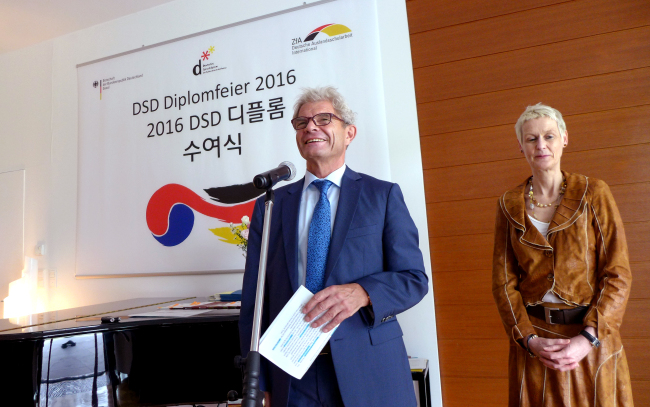
“Our bilateral economic cooperation is strong and growing, and those who speak both languages and understand both cultures will be increasingly sought by companies, institutes and schools,” said German Ambassador Rolf Mafael in a speech. “The German language has become increasingly popular around the world, with 15.5 million learners. Lately, the biggest enrollment is happening in China and India.”
In Korea, the program started in 2008, and German teachers and learning materials have been sent to high schools across the country. The number of German language students in university has grown significantly over the last 5 years, aided by the Goethe-Institut Korea, which runs language and cultural programs.
There are currently about 25,000 Koreans students getting their knack of German: some 11,500 in high schools, 5,000 through the Goethe-Institut Korea and 8,500 at universities and other institutions.
Since 2012, the language’s popularity has soared, particularly among young adults, the ambassador remarked, adding that three additional Goethe-Instituts have opened in Daegu, Gwangju and Busan following those in Seoul and Daejon.
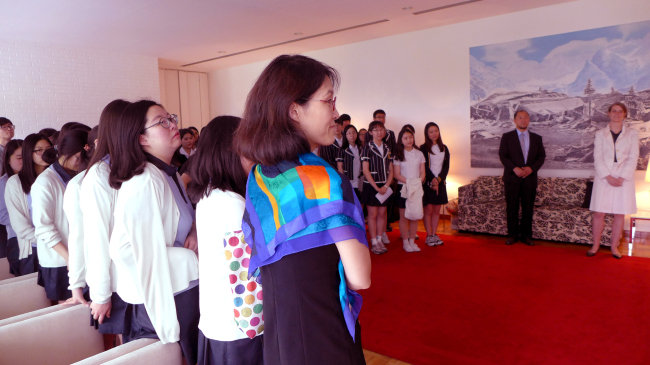
“The biggest reason seems to be to go to Germany to study, particularly for master’s courses, and to work,” he told The Korea Herald.
Noting that many Koreans between the ages 50 and 75 learned German in their youth -- in the 1960s and 70s when Korea dispatched miners and nurses to Germany’s industrial front lines to feed the country’s development -- the envoy said companies have benefitted from hiring those workers’ children, who were well-versed in language and culture. However, with their numbers depleting, companies need fresh new replenishment of human capital, he added.
“Everyone told me that if you combine the Korean ‘ppali-ppali’ (quickly, quickly) mentality and dynamic energy with Germany’s long-term and problem-solving approach, then you really get top talents,” the diplomat said.
“Therefore, we are working hard to increase exchanges in both directions. The number of German university students coming to Korea is continuously rising, and our aim is to reach 1,000 a year from the current 600-700. Some 5,000 Korean students are studying in German universities now, a steady number over the last 10 years.”

Regarding the strengths of German education, Mafael argued that first and foremost, the curriculum is qualitatively even across the country due to Germany’s decentralized history.
Mentioning that he has his five sons enrolled in different universities in Germany, Mafael underlined: “Whether you enroll in a top 50 or 100 school in Germany, you can still be guaranteed roughly the same quality of learning as in the top 5 or 10.”
Cities such as Berlin, Munich, Cologne, Dusseldorf, Frankfurt, Freiburg, Hamburg and Heidelberg all have competed to nurture top schools, the envoy highlighted, adding that requirements are similarly weighty across regions.
As a second strength, he stressed, the country is a world leader in engineering, natural sciences, philosophy and music education. Many master’s programs are offered in English, and strong collaboration between universities and research institutes -- the Max Planck Institutes, the Helmholtz Institutes and the Fraunhofer Society -- helps turn students into professional scholars.
To strengthen bilateral cooperation, the Germany-Korea alumni network Adeko -- chaired by former Korean Prime Minister Kim Hwang-sik -- hosts an annual conference on science and innovation, with the next event scheduled in August in Dresden. The German Academic Exchange Service operates an office in Seoul, and the Alexander von Humboldt-Foundation provides research grants.
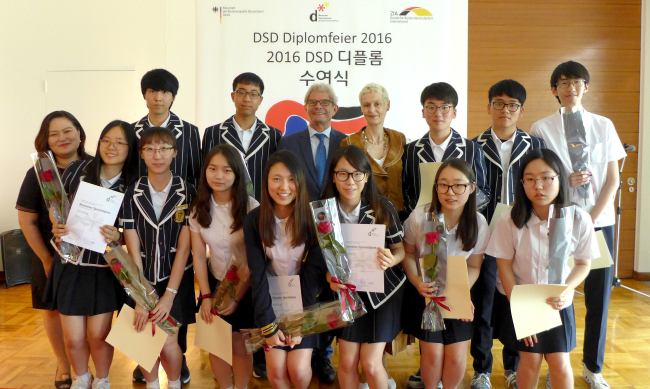
As the third advantage, Mafael emphasized the universities combine theory with practice, enabling “very close links” between students and employers. A new system called the “dual university” allows students to spend half their time studying and the other half apprenticing at firms, which pay for their studies.
“So they get constant feedbacks on what the companies need and how they can apply their lessons. The fastest growing universities in Germany are those that offer this program.”
The Baden-Wurttemberg Cooperative State University is located in the economic powerhouse region in southern Germany. As a cluster of world-leading scientific and industrial innovation, the school excels in engineering, economics, social sciences and hospital-related studies with tailored coop programs.
To make the most out of these opportunities, Mafael advised moving to Germany before graduating from Korean universities to undergo various trainee programs and establish job connections. The embassy granted some 2,000 working holiday visas last year, and the Human Resources Development Service of Korea offers programs and information for obtaining jobs in Germany.

Student Kim Na-yeon, 18, who participated in the program for three years, is now majoring in German literature at Hanyang University. Although she did not speak a word of German initially, she said she can now comfortably take university courses in German.
Student Lee Na-hee, 17, who is enrolled in the DSD 1 program, said she chose to enroll to maximize communication with native German speakers. Both students said they spent two hours each, two to three days a week, reading, listening and debating in German.
Admitting that German is underappreciated in Korea, both highlighted the need to promote the program more. They suggested that a better recognition in university entrance would raise its profile.
By Joel Lee (joel@heraldcorp.com)
-
Articles by Korea Herald






![[Weekender] Korean psyche untangled: Musok](http://res.heraldm.com/phpwas/restmb_idxmake.php?idx=644&simg=/content/image/2024/05/02/20240502050841_0.jpg&u=)

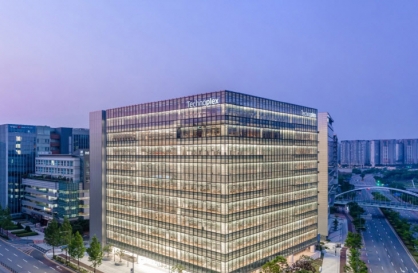
![[Eye Interview] 'If you live to 100, you might as well be happy,' says 88-year-old bestselling essayist](http://res.heraldm.com/phpwas/restmb_idxmake.php?idx=644&simg=/content/image/2024/05/03/20240503050674_0.jpg&u=)
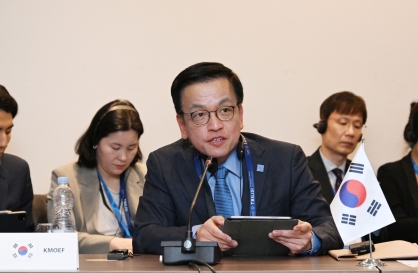







![[Herald Interview] Director of 'Goodbye Earth' aimed to ask how we would face apocalypse](http://res.heraldm.com/phpwas/restmb_idxmake.php?idx=652&simg=/content/image/2024/05/03/20240503050732_0.jpg&u=)
